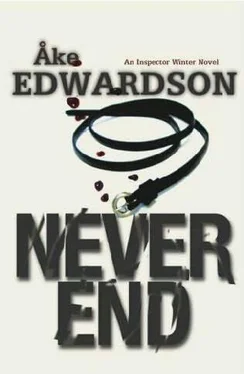I recognize her, Helander thought. I recognize her now.
Was it tension or excitement she was feeling?
***
The beach party had been changed to the evening. Winter felt as if Christmas had come early as he biked southward with Elsa in the child seat. Angela was pedaling away ten meters ahead of them. He was thinking mainly about wind and sun as they rode around the bay and parked alongside thirty more bikes, then clambered down to the beach.
Somebody had started the barbecues, and one of the men handed Winter a beer. Anders Liljeberg, the first time he'd seen him for months. He hadn't seen several of the people milling around since the early summer, and he was glad to be here now. He drank his beer and settled down on the sands. Angela took Elsa to the water's edge. He leaned back and let all the voices buzz over him. He could smell the grills. He could smell the sand. He raised himself on an elbow and finished off the beer. Angela and Elsa were splashing around in the water. Liljeberg had donned a grass skirt. It looked dark brown through Winter's sunglasses. Liljeberg started dancing his version of the samba, and others joined in. Winter stood up and took off his shirt. Somebody passed him another beer. The music was Caribbean, and the evening was just as hot as the music.
The music flowed over them. From where she was lying she could see the contours of the buildings opposite, the outline of the rooftops. Something round that might be a tree. The music was soft: an acoustic guitar, viola, cello, a piano.
"It's beautiful," she said.
"A map of the world," he said.
"Hmm?"
"That's what the CD's called. A Map of the World. Pat Metheny. Film music, I think."
"I haven't seen it in your collection before," she said.
"I bought it today. This is the first time I've listened to it."
"What do you think?"
"It's good. Not something I would've discovered myself, but Winter had recommended it."
Aneta Djanali didn't answer. She moved slightly to the right, a bit closer to Halders, who was lying still on his back in bed.
The children were asleep, had been for hours. He'd slept, twenty minutes maybe. It seemed like it at least. She hadn't slept.
How had they gotten into this position?
Why not?
They still had their clothes on. It wasn't… like that. Not yet, at least, she thought, as a new track started, just the guitar now.
What would she have done if Fredrik had unfastened the top button of her blouse?
He would never do that. She wasn't even completely sure that he would want to. But maybe he would. Maybe he'd been about to do it. Should she do it? Or should they continue being almost like brother and sister? With the difference that grown-up brothers and sisters aren't together all day and all evening and half the night, as they were doing now.
Did he love his wife? He had in the beginning. He must have. Then they'd lost each other.
She raised her right wrist and checked the fluorescent hands of her watch: 2:00 a.m. It was starting to be morning out there. She moved her head slightly to see better. The night was weak now, the light stronger. It was taking over. It had been the other way around for some hours, and Fredrik had quoted Dylan Thomas, as he had done another evening, possibly wrongly, possibly correctly: "Do not step gently into the good night." "It's the only part of the poem I know," he'd said, "but I remember it from the sleeve of a record Chris Hillman made a few years ago."
He was wheezing beside her now, the man who got his literary education from the sleeves of country records.
He had loved his wife, and perhaps still did, when he was alone; but that was not something he spoke about. There were the children to consider. He talked about the children. Sometimes a lot, sometimes not so much. It was the children he cared most about now. The children were here, in their rooms on the other side of the hall. He kept going in to see them, when it was time for bed, and when they were asleep.
She sometimes thought that that was all that mattered for Fredrik Halders. He didn't show it, didn't speak about it. He was one of those men who long for company but are scared of actual contact. Who hide behind words that are hard and slippery and sure and empty.
Who can do away with themselves? she now thought, as the first signs of the sun appeared over the rooftops. Who suddenly wanted to leave, fast, right now, wanted to run away, as quickly as they could.
***
Winter had driven westward in the light of morning. Bengt and Lisen had had coffee waiting for him, which he'd drunk in the kitchen. There was a smell of freshly baked buns, and he accepted one from a tray, still warm. "When Beatrice… left us, I spent hours baking," said Lisen Wägner. "Baked and baked away like a madwoman. Fruitcake in the middle of the night, croissants, bread rolls. I threw it away: while it was still hot, I threw it all away," she said, looking at the baking tray.
Winter chewed the bun.
How the hell was he going to put this?
Was Beatrice a stripper in her spare time, as far as you know? Was that the in thing among high school girls five years ago?
He'd seen the looks on their faces, and it was obvious that they didn't know, hadn't known.
Had he and his colleagues checked thoroughly enough with the other relatives? They hadn't made house calls on everybody associated with Beatrice and her family. At that time they hadn't had the photograph of Beatrice sitting in the same place as Angelika five years later.
He'd finished chewing, swallowed, and took out the photograph again.
"We can't find this place," he said. "We've searched all of Gothenburg."
"Then it can't be here," Bengt Wägner said.
"I think it is," Winter replied. He mentioned Angelika's name again and produced the photograph of her as well.
"Hmm. I suppose that makes it more likely," Wägner said.
"It might be in a private house," said Winter.
"Whose?" asked Lisen Wägner.
"I don't suppose it could be somebody you know?"
"Eh? Who on earth would that be?" she wondered.
"For God's sake," her husband exclaimed. "What kind of an answer is that?"
She had turned away to look at the table with the tray of buns cooling down. He had looked at Winter.
"If we'd recognized it we'd have said so right away, of course. It doesn't matter whether it's in somebody's house, or where it is."
"No."
"Can I keep this photograph?"
"Of course."
"You never know."
Winter handed over the copy. He'd intended to do that anyway.
He'd been to see Lars-Olof and Ann Hansson late last night. That conversation had been a replica of this one.
***
Sara Helander was sitting at the big table in the conference room. She was tanned, browner than he was.
"And then along came the ferry, just in time," she said. "I ran to catch it and it took off, and I had them in view the entire journey."
"Well done, Sara."
"Their boat was moored ten meters from the ferry stop, and when I got off I saw them leaving their boat."
Winter waited. Halders waited, Ringmar and Bergenhem waited, Aneta Djanali, Mollerstrom, everybody.
Helander had told them about the woman; the pictures from Angelika's graduation party had done the rounds again. It's her all right, Helander had said. It's her.
"And so I followed them," she said. "It wasn't very far. There were quite a lot of people going to and from the jetty and the ferry stop, so it was no problem."
"There should never be any problem," said Halders.
"Then it became a bit more difficult,… but naturally no problem then, either," said Helander, glancing toward Halders. "And then… well, they went into a house on the other side of the road and I kept on walking past it." She looked around. "A pretty big house, built of wood."
Читать дальше












